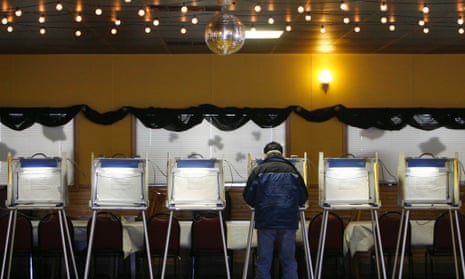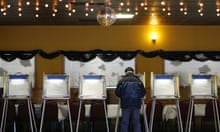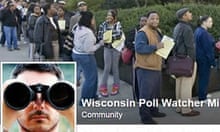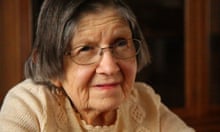Election officials and civil liberties advocates are predicting that a surprise court ruling that lifted a stay on Wisconsin’s controversial voter-ID law will produce chaos on election day, as estimates suggest that up to 300,000 eligible voters may not have the documentation now required to vote.
With only six weeks to go before the general election – including a hotly contested gubernatorial campaign – activists say there is little chance that identification papers can be issued in time to all those who lack them. Thousands of absentee ballots had already been mailed before the ruling on September 12, without any reference to the voter ID requirement.
Neil Albrecht, the election commissioner for the City of Milwaukee, where more than 280,000 people voted in the 2012 election, told that Guardian that the limited time in which to implement the law would result in confusion on election day since many voters would likely turn up without the required ID.
“When voters struggle, that slows down the operation of a polling place so that it can become very bottle-necked.” Albrecht said that he would be hiring 300 to 400 more poll workers to deal with the expected slowdowns.
The state’s Department of Motor Vehicles (DMV) would have to issue 6,000 IDs a day in order to serve all 300,000 estimated eligible voters, said Larry Dupuis, the legal director at the ACLU of Wisconsin. “There’s no way they can do that,” he said.
The DMV, the agency charged with issuing these IDs, said that it is not currently planning on adding staff or extra hours in the run-up to the election. Jim Miller, the director of the DMV’s Department of Field Services, said the agency estimates it will get roughly 220 new requests for ID each week. In the week since the decision to allow the ID law to move forward, fewer than 100 people applied for new IDs, according to Miller.
The Government Accountability Board in Madison confirmed that approximately 6,500 absentee ballots had been mailed before the court’s September 12 decision and that they did not include information about the voter ID requirement. Approximately 200 ballots have already been received, and will be considered invalid unless the voters send in a copy of a valid photo ID.
Wisconsin’s election system is unusual because it is highly decentralized, which could lead to further problems. Instead of being run by the state, elections are handled by municipal clerks. Reid Magney of the board, which oversees election processes for the state, said that there are 1,852 municipal clerks, and each of these offices sends out its own absentee ballots, among other election-related duties.
Madison’s clerk, Maribeth Witzel-Behl, said in court testmony that she would be asking the mayor for an additional $96,000 to cover the cost of training poll workers and publishing new materials.
Madison has 172,000 registered voters, according to Witzel-Behl’s affidavit, and generally has a turnout of 80%.
Witzel-Behl wrote that “implementation of the voter ID law at this late date … likely will cause significant confusion for voters and poll workers and cause disruptions and delays at the polls.”
She also noted that while the main campus of the University of Wisconsin has developed an alternative student ID that is valid for voting, it has done little to inform its student body of roughly 40,000 about this option.
The voter ID law was challenged by several groups including the American Civil Liberties Union of Wisconsin, the League of United Latin American Citizens of Wisconsin, and Advancement Project. Reports have noted that the only case of voter fraud in Wisconsin occurred in 2012 when a man voted multiple times for Governor Scott Walker. On Tuesday, the group filed an emergency motion for a rehearing, suggesting that it be conducted “en banc,” that is, before the full court. The response is expected on Tuesday.
Researchers, advocates and public officials alike agree that the voter ID law will disproportionately affect low-income and minority populations.
Research into the impact that the state’s law would have on Milwaukee County minority groups found approximately 91,615 voters lack the proof of citizenship and residency needed to obtain a state ID or driver’s license.
The study, conducted by Prof Matt Barreto of the University of Washington, aimed to determine whether there would be significant racial disparities in the voter ID law’s impact. Its findings were unequivocal: “Blacks are 182% more likely to lack accepted ID, and Latinos are 206 % more likely to lack accepted ID than are whites.”
For Christine Neumann-Ortiz, executive director of Voces de la Frontera, a Milwaukee-based organization focusing on immigrants’ rights, the law and its implementation are “an attack on the gains of the civil rights movement. It’s an indirect poll tax.”
She pointed out that very few documents, such as birth certificates, constitute valid proof of identity under the law, but that spelling errors or other problems can invalidate them.
“You need to get changes made to out of state birth certificates. By the time the changes are made, you have been denied the ability to vote.” Neumann-Ortiz also pointed to the case of a former US marine, Ricky Lewis, who has been struggling to obtain a valid voter ID although he was born in Wisconsin.
Nearly 25% of the population in Milwaukee County is African American while the Latino population nears 8%.
For Bettye Jones, changing her residency from Ohio to Wisconsin led to a struggle that lasted from December 2011 to April 2012. Jones was born in rural Tennessee in the 1930s. Her second daughter, Sheryl Jones-Harper, told the Guardian: “Since she was not born in a hospital, there was not record of her birth, which was not uncommon for African Americans in the 1930s.”
Jones-Harper said that if her older sister, Debra, had not been self-employed and willing to help their mother, Mrs Jones would likely never have managed to get her voter ID. She also critiqued the state’s adjudication process for people like her mother who simply do not have the required documents.
“When the governor of Wisconsin came up with alternative forms of documentation in lieu of the state ID, it’s still at the discretion of a worker, so it’s still not that you have the right to vote.” Jones-Harper stated that in her view, this process “[is] still another form to me of voter suppression because there’s no guarantee that it’s going to be accepted.”








Comments (…)
Sign in or create your Guardian account to join the discussion